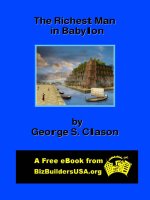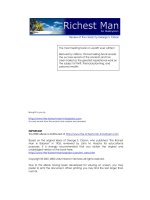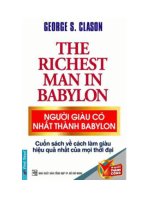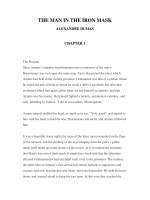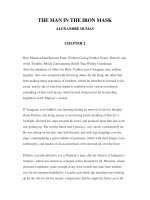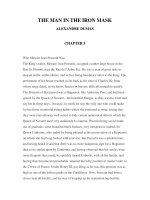The richest man in babylon
Bạn đang xem bản rút gọn của tài liệu. Xem và tải ngay bản đầy đủ của tài liệu tại đây (920.14 KB, 191 trang )
0
SIGNET
THE SUCCESS SECRETS OF THE ANCIENTS THE MOST INSPIRING BOOK ON
WEALTH EVER WRITTEN
GEORGE S.
CLASON
THE
RICHEST
MANIN
BABYLON
Money is the medium by which earthly success is measured.
Money makes possible the enjoyment of the
best the earth affords.
Money is plentiful for those who understand
the simple laws which govern its acquisition.
Money is governed today by the same laws
which controlled it when prosperous men
thronged the streets of Babylon, six thousand
years ago.
Lo, MONEY IS PLENTIFUL
FOR THOSE WHO UNDERSTAND
THE SIMPLE RULES OF ITS ACQUISITION
1.
2.
3.
4.
5.
6.
Start thy purse to fattening
Control thy e xpenditures
Make thy gold multiply
Guard thy treasures from loss
Make of thy dwelling a profitable investment
Insure a future income
7. Increase thy ability to earn —The Richest Man
in Babylon
READ ON FOR MORE!
"What can a book written in the 1920s tell modern
investors about their finances? A whole lot if it's
George Clason's delightful set of parables that ex plain the basics of money. This is a great gift for a
graduate or anyone who seems baffled by the world
of finance and a wonderful, refreshing read for even
the most experienced investor." —Los Angeles Times
Ahead of you stretches your future, like a road
leading into the distance. Along that road are ambitions you wish to accomplish . . . desires you wish
to gratify.
To bring your ambitions and desires to fulfilment,
you must be successful with money. Use the financial
principles made clear in the pages that follow. Let
them guide you away from the stringency of a lean
purse to that fuller, happier life a full purse makes
possible.
Like the law of gravity, these laws of money are
universal and unchanging. May they prove to be for
you, as they have proven to so many others, a sure
key to a fat purse, larger bank balances and gratifying
financial progress.
THE
RICHEST
MAN IN
BABYLON
George S. Clason
A SIGNET BOOK
SIGNET
Published by New American Library, a division of
Penguin Putnam Inc., 375 Hudson Street,
New York, New York 10014, U.S.A.
Penguin Books Ltd, 80 Strand,
London WC2R ORL, England
Penguin Books Australia Ltd, 250 Camberweil Road,
Camberwell, Victoria 3124, Australia
Penguin Books Canada Ltd, 10 Alcorn Avenue,
Toronto, Ontario, Canada M4V 3B2
Penguin Books (N.Z.) Ltd, 182-190 Wairau Road,
Auckland 10, New Zealand
Penguin Books Ltd, Registered Offices:
Harmondsworth, Middlesex, England
Published by Signet, an imprint of New American Library,
a division of Penguin Putnam Inc. Previously published in a Dutton edition.
First Signet Printing, February 1988
10 9 8 7 6 5 4 3
Copyright George S. Clason, 1926, 1930, 1931, 1932, 1936, 1937, 1940, 1946,
1947, 1954, 1955
All rights reserved
REGISTERED TRADEMARK—MARCA REG1 STRADA
Printed in the United States of America
Without limiting the rights under copyright reserved above, no part of
this publication may be reproduced, stored in or introduced into a
retrieval system, or transmitted, in any form, or by any means (electronic,
mechanical, photocopying, recording, or otherwise), without the prior written
permission of both the copyright owner and the above publisher of this
book.
BOOKS ARE AVAILABLE AT QUANTITY DISCOUNTS WHEN USED TO
PROMOTE
PRODUCTS OR SERVICES. FOR INFORMATION PLEASE WRITE TO
PREMIUM
MARKETING DIVISION, PENGUIN PUTNAM INC., 375 HUDSON STREET, NEW
YORK, NEW YORK 10014.
If you purchased this book without a cover you should be aware that this
book is stolen property. It was reported as "unsold and destroyed"
to the publisher and neither the author nor the publisher has received
any payment for this "stripped book."
Contents
Foreword
The Man Who Desired Gold
ix
1
The Richest Man in Babylon
Seven Cures for a Lean Purse
9
22
Meet the Goddess of Good Luck
The Five Laws of Gold
The Gold Lender of Babylon
The Walls of Babylon
The Camel Trader of Babylon
The Clay Tablets from Babylon
The Luckiest Man in Babylon
43
59
74
89
94
106
118
An Historical Sketch of Babylon
138
Foreword
Our prosperity as a nation depends upon the personal
financial prosperity of each of us as individuals.
This book deals with the personal successes of each
of us. Success means accomplishments as the result
of our own efforts and abilities. Proper preparation
is the key to our success. Our acts can be no wiser
than our thoughts. Our thinking can be no wiser than
our understanding.
This book of cures for lean purses has been termed
a guide to financial understanding. That, indeed, is
its purpose: to offer those who are ambitious for financial success an insight which will aid them to
acquire money, to keep money and to make their
surpluses earn more money.
In the pages which follow, we are taken back to
Babylon, the cradle in which was nurtured the basic
principles of finance now recognized and used, the
world over.
To new readers the author is happy to extend the
wish that its pages may contain for them the same
ix
x FOREWORD
inspiration for growing bank accounts, greater financial successes and the solution of difficult personal financial problems so enthusiastically reported
by readers from coast to coast.
To the business executives who have distributed
these tales in such generous quantities to friends, relatives, employees and associates, the author takes
this opportunity to express his gratitude. No endorsement could be higher than that of practical men
who appreciate its teachings because they, themselves, have worked up to important successes by
applying the very principles it advocates.
Babylon became the wealthiest city of the ancient
world because its citizens were the richest people of
their time. They appreciated the value of money.
They practiced sound financial principles in acquiring
money, keeping money and making their money earn
more money. They provided for themselves what we
all desire . . . incomes for the future.
G. S. C.
THE
RICHEST
MAN IN
BABYLON
The Man Who
Desired Gold
Bansir, the chariot builder of Babylon, was thoroughly discouraged. From his seat upon the low wall
surrounding his property, he gazed sadly at his simple
home and the open workshop in which stood a
partially completed chariot.
His wife frequently appeared at the open door. Her
furtive glances in his direction reminded him that the
meal bag was almost empty and he should be at
work finishing the chariot, hammering and hewing,
polishing and painting, stretching taut the leather
over the wheel rims, preparing it for delivery so he
could collect from his wealthy customer.
Nevertheless,' his fat, muscular body sat stolidly
upon the wall. His slow mind was struggling patiently with a problem for which he could find no
answer. The hot, tropical sun, so typical of this valley
of the Euphrates, beat down upon him mercilessly.
Beads of perspiration formed upon his brow and
trickled down unnoticed to lose themselves in the
hairy jungle on his chest.
2 THE RICHEST MAN IN BABYLON
Beyond his home towered the high terraced walls
surrounding the king's palace. Nearby, cleaving the
blue heavens, was the painted tower of the Temple
of Bel. In the shadow of such grandeur was his simple home and many others far less neat and well
cared for. Babylon was like this—a mixture of grandeur and squalor, of dazzling wealth and direst poverty, crowded together without plan or system within
the protecting walls of the city.
Behind him, had he cared to turn and look, the
noisy chariots of the rich jostled and crowded aside
the sandaled tradesmen as well as the barefooted
beggars. Even the rich were forced to turn into the
gutters to clear the way for the long lines of slave
water carriers, on the "king's business," each bearing
a heavy goatskin of water to be poured upon the
hanging gardens.
Bansir was too engrossed in his own problem to
hear or heed the confused hubbub of the busy city.
It was the unexpected twanging of the strings from
a familiar lyre that aroused him from his reverie. He
turned and looked into the sensitive, smiling face of
his best friend—Kobbi, the musician.
"May the Gods bless thee with great liberality, my
good friend," began Kobbi with an elabourate salute.
"Yet, it does appear they have already been so generous thou needest not to labour. I rejoice with thee in
thy good fortune. More, I would even share it with
thee. Pray, from thy purse which must be bulging
else thou wouldst be busy in yon shop, extract but
two humble shekels and lend them to me until after
the noblemen's feast this night. Thou wilt not miss
them ere they are returned."
"If I did have two shekels," Bansir responded
gloomily, "to no one could I lend them—not even to
1
4 THE RICHEST MAN IN BABYLON
you, my best of friends; for they would be my fortune—my entire fortune. No one lends his entire fortune, not even to his best friend."
"What," exclaimed Kobbi with genuine surprise.
"Thou hast not one shekel in thy purse, yet sit like
a statue upon a wall! Why not complete that chariot?
How else canst thou provide for thy noble appetite?
'Tis not like thee, my friend. Where is thy endless
energy? Doth something distress thee? Have the
Gods brought to thee troubles?"
"A torment from the Gods it must be," Bansir
agreed. "It began with a dream, a senseless dream,
in which I thought I was a man of means. From my
belt hung a handsome purse, heavy with coins. There
were shekels which I cast with careless freedom to
the beggars; there were pieces of silver with which I
did buy finery for my wife and whatever I did desire
for myself; there were pieces of gold which made me
feel assured of the future and unafraid to spend the
silver. A glorious feeling of contentment was within
me! You would not have known me for thy hardworking friend. Nor wouldst have known my wife,
so free from wrinkles was her face and shining with
happiness. She was again the smiling maiden of our
early married days."
"A pleasant dream, indeed," commented Kobbi,
"but why should such pleasant feelings as it aroused
turn thee into a glum statue upon the wall?"
"Why, indeed! Because when I awoke and remembered how empty was my purse, a feeling of rebellion swept over me. Let us talk it over together, for,
as the sailors do say, we ride in the same boat, we
two. As youngsters, we went together to the priests
to learn wisdom. As young men, we shared each other's pleasures. As grown men, we have always been
The Man Who Desired Gold 5
close friends. We have been contented subjects of our
kind. We have been satisfied to work long hours and
spend our earnings freely. We have earned much
coin in the years that have passed, yet to know the
joys that come from wealth, we must dream about
them. Bah! Are we more than dumb sheep? We live
in the richest city in all the world. The travellers do
say none equals it in wealth. About us is much display of wealth, but of it we ourselves have naught.
After half a lifetime of hard labour, thou, my best of
friends, hast an empty purse and sayest to me, 'May
I borrow such a trifle as two shekels until after the
noblemen's feast this night?' Then, what do I reply?
Do I say, 'Here is my purse; its contents will I gladly
share?' No, I admit that my purse is as empty as
thine. What is the matter? Why cannot we acquire
silver and gold—more than enough for food and
robes?
"Consider, also, our sons," Bansir continued, "are
they not following in the footsteps of their fathers?
Need they and their families and their sons and their
sons' families live all their lives in the midst of such
treasurers of gold, and yet, like us, be content to banquet
upon sour goat's milk and porridge?"
"Never, in all the years of our friendship, didst
thou tal k like this b ef or e, Bansir . " Ko bb i was
puzzled.
"Never in all those years did I think like this before. From early dawn until darkness stopped me, I
have laboured to build the finest chariots any man
could make, soft-heartedly hoping some day the
Gods would recognize my worthy deeds and bestow
upon me great prosperity. This they have never done.
At last, I realize this they will never do. Therefore,
my heart is sad. I wish to be a man of means. I wish
6 THE RICHEST MAN IN BABYLON
to own lands and cattle, to have fine robes and coins
in my purse. I am willing to work for these things
with all the strength in my back, with all the skill in
my hands, with all the cunning in my mind, but I
wish my labours to be fairly rewarded. What is the
matter with us? Again I ask you! Why cannot we
have our just share of the good things so plentiful for
those who have the gold with which to buy them?"
"Would I know an answer!" Kobbi replied. "No
better than thou am I satisfied. My earnings from my
lyre are quickly gone. Often must I plan and scheme
that my family be not hungry. Also, within my breast
is a deep longing for a lyre large enough that it may
truly sing the strains of music that do surge through
my mind. With such an instrument could I make
music finer than even the king has heard before?"
"Such a lyre thou shouldst have. No man in all
Babylon could make it sing more sweetly; could
make it sing so sweetly, not only the king but the
Gods themselves would be delighted. But how mayest thou secure it while we both of us are as poor as
the king's slaves? Listen to the bell! Here they come."
He pointed to the long column of half-naked, sweating
water bearers plodding labouriously up the narrow
street from the river. Five abreast they marched, each
bent under a heavy goatskin of water.
"A fine figure of a man, he who doth lead them."
Kobbi indicated the wearer of the bell who marched
in front without a load. "A prominent man in his
own country, 'tis easy to see:"
"There are many good figures in the line," Bansir
agreed, "as good men as we. Tall, blond men from
the north, laughing black men from the south, little
brown men from the nearer countries. All marching
together from the river to the gardens, back and
The Man Who Desired Gold 7
forth, day after day, year after year. Naught of happiness to look forward to. Beds of straw upon which
to sleep—hard grain porridge to eat. Pity the poor
brutes, Kobbi !"
"Pity them I do. Yet, thou dost make me see how
little better off are we, free men though we call
ourselves."
"That is truth, Kobbi, unpleasant thought though it
be. We do not wish to go on year after year living slavish
lives. Working, working, working! Getting nowhere."
"Might we not find out how others acquire gold
and do as they do?" Kobbi inquired.
"Perhaps there is some secret we might learn if we
but sought from those who knew," replied Bansir
thoughtfully.
"This very day," suggested Kobbi, "I did pass our
old friend, Arkad, riding in his golden chariot. This
I will say, he did not look over my humble head as
many in his station might consider his right. Instead,
he did wave his hand that all onlookers might see
him pay greetings and bestow his smile of friendship
upon Kobbi, the musician."
"He is claimed to be the richest man in all Babylon," Bansir mused.
"So rich the king is said to seek his golden aid in
affairs of the treasury," Kobbi replied.
"So rich," Bansir interrupted, "I fear if I should
meet him in the darkness of the night, I should lay
my hands upon his fat wallet."
"Nonsense," reproved Kobbi, "a man's wealth is
not in the purse he carries. A fat purse quickly empties if there be no golden stream to refill it. Arkad
has an income that constantly keeps his purse full,
no matter how liberally he spends."
"Income, that is the thing," ejaculated Bansir. "I
The Man Who Desired Gold 8
wish an income that will keep flowing into my purse
whether I sit upon the wall or travel to far lands.
Arkad must know how a man can make an income
for himself. Dost suppose it is something he could
make clear to a mind as slow as mine?"
"Methinks he did teach his knowledge to his son,
Nomasir," Kobbi responded. "Did he not go to Nineveh and, so it is told at the inn, become, without
aid from his father, one of the richest men in that
city?"
"Kobbi, thou bringest to me a rare thought." A
new light gleamed in Bansir's eyes. "It costs nothing
to ask wise advice from a good friend and Arkad
was always that. Never mind though our purses be
as empty as the falcon's nest of a year ago. Let that
not detain us. We are weary of being without gold
in the midst of plenty. We wish to become men of
means. Come, let us go to Arkad and ask how we,
also, may acquire incomes for ourselves."
"Thou speakest with true inspiration, Bansir. Thou
bringeth to my mind a new understanding. Thou
makest me to realize the reason why we have never
found any measure of wealth. We never sought it.
Thou hast laboured patiently to build the staunchest
chariots in Babylon. To that purpose was devoted
your best endeavours. Therefore, at it thou didst succeed. I strove to become a skilful lyre player. And,
at it I did succeed.
"In those things toward which we exerted our best
endeavours we succeeded. The Gods were content to
let us continue thus. Now, at last, we see a light,
bright like that from the rising sun. It biddeth us to
learn more that we may prosper more. With a new
understanding we shall find honourable ways to accomplish our desires."
9 THE RICHEST MAN IN B ABYLON
"Let us go to Arkad this very day," Bansir urged.
"Also, let us ask other friends of our boyhood days, .
who have fared no better than ourselves, to join us
that they, too, may share in his wisdom."
"Thou wert ever thus thoughtful of thy friends,
Bansir. Therefore hast thou many friends. It shall be
as thou sayest. We go this day and take them with
us."

